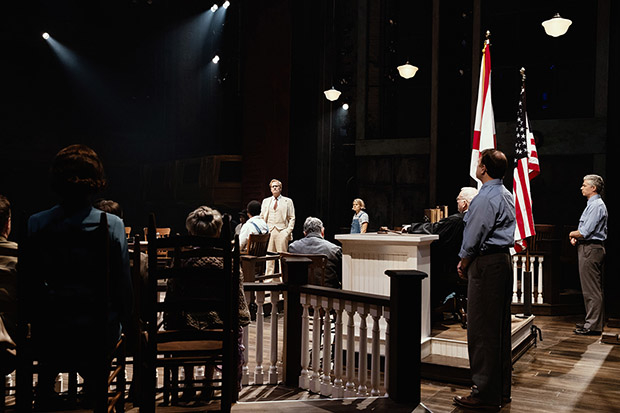Broadway Shockers 2018: Harper Lee's Estate Sues Producers of To Kill a Mockingbird
Aaron Sorkin’s stage adaptation of the beloved novel nearly spawned its own courtroom drama.
As 2018 draws to a close, TheaterMania looks back on some of the most jaw-dropping stories of the year.

(© Julieta Cervantes)
On December 13, the cast of the long-awaited Broadway debut of Harper Lee's To Kill a Mockingbird took its opening night bow. It was a joyous moment, made all the more triumphant considering that the production appeared in peril just nine months ago.
In March, the Lee Estate filed a lawsuit arguing that playwright Aaron Sorkin's script deviated too much from the spirit of the original novel. Lee's attorney and executor, Tonja B. Carter, laid out specific grievances in the suit: Sorkin depicted Atticus Finch (the gentlemanly Southern lawyer at the heart of the story) drinking whiskey after a trial, keeping a gun in his closet, and taking the Lord's name in vain — three things that Carter argues he would never do. More controversially, Carter took issue with a scene in which Calpurnia confronts Atticus about his parenting choices, insisting that a typical black maid in the 1930s would never engage in such backtalk.
Fans of the novel might retort that Lee wrote Calpurnia as an extraordinary black maid, and therefore such complaints are invalid. Sorkin seems to agree, and initially balked at making any alterations. "The play can't be written by a team of lawyers," he said to lead producer Scott Rudin, as revealed in a first-person account of the incident. In what would have been the must-see theatrical event of the season, Rudin even offered to stage the entire play in federal court so that a judge could determine if Sorkin's artistic liberties went beyond the pale.
In the end, the matter was settled without going to trial. Sorkin made some changes to the script, and Carter dropped the suit, allowing the show to go on. Considering that the production is regularly pulling in $1.3 million a week (a giant haul for a nonmusical), we anticipate a happy ending for all parties.








